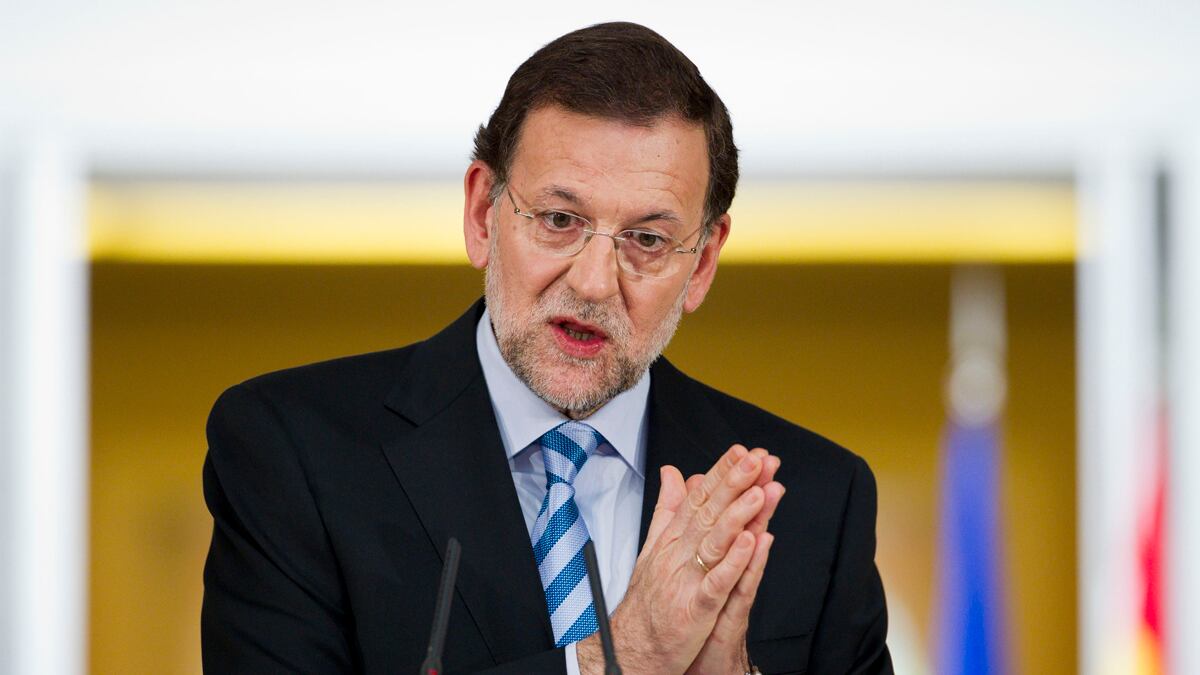At a press conference Sunday, Spanish Prime Minister Mariano Rajoy gave the impression that the agreement to ask the European Union for as much as $125 billion to bail out Spain’s financial sector is just one step on the long path toward prosperity—no need to worry.
But as corruption investigations into Spanish banks’ shady property deals continue, and as independent auditors prepare their views on the country’s banking sector, the reasons for the EU lifeline could prove much more sinister. Spanish banks, specifically the savings banks, are collapsing because of greed, corruption, and denial.
“It would have been bad news for Europe had Spain’s banks failed,” said José Ignacio Torreblanca, a senior research fellow at the European Council on Foreign Relations. “So it was in everyone’s interest that this should happen. The only real criticism can be made against the Spanish government, which took an absurd position—first denying that a bailout was in the works and then trying to sell it as a political victory.”
The latest tally from the Bank of Spain says Spanish banks hold around $233 billion in “problematic” real-estate holdings, including mortgages and repossessed homes. Empty building blocks and half-finished property developments litter the country, hangovers from when credit was cheap and banks issued loans for more money than they could cover. Banks began to operate outside their normal jurisdictions, opening branches at a record pace and financing housing projects to sign up the new homeowners as customers.
Nearly half of Spanish loans are issued by Spain’s savings banks, known as cajas de ahorros: semipublic institutions that, prior to a 2010 reform, were unlisted and had to allot a percentage of their profits to social programs. The regional governments, however, oversee the cajas. In many cases, regional politicians have used their influence over the cajas to finance unsound projects.
On the eastern coast of Spain in Castellón, for example, sits a $250 million airport that has yet to welcome an airplane’s wheels on its tarmac. With visions of golf courses and luxury resorts to build during the boom years, the former provincial leader needed an airport. No problem.

Down in Castilla–La Mancha, a desolate area south of Madrid known as the home of Don Quixote, the local caja got in over its head with another political boondoggle: a casino resort and an international airport. Nevada-based Harrah’s and other developers eventually scrapped the casino plan, but in 2008 Caja Castilla–La Mancha (CCM) and the regional government built its $1.4 billion airport. No problem. It could accommodate 2.5 million passengers a year, but drew around 45,000 annually for the two routes scheduled. The airport shut down in April.
At present, Spain’s anti-corruption prosecutors are investigating CCM, and there are open cases into political and financial irregularities in the Valencia region linked to savings banks CAM and Bancaja.
But these investigations pale in comparison to what could lurk behind the fall of Bankia, Spain’s fourth-largest bank and the most exposed to toxic real-estate assets, worth around $40 billion. Last week, the anti-corruption squad opened an investigation into Bankia—the result of a merger of seven cajas—to see if the financial group broke any laws prior to receiving $30 billion in state aid in late May. Several grassroots organizations, including the Indignados movement, plan to lodge their own lawsuits this month. In one day last week, it raised around $24,500 in small donations to cover legal costs.
Bankia went public last July, drawing in around 400,000 small shareholders who have watched their investments disappear as Bankia’s stock price fell 74 percent over the past 12 months. Another anomaly has been found in its bookkeeping. In February, Bankia reported a 2011 profit of $390 million. Last month it revised this to a nearly $3.8 billion loss.
And now the EU bailout. The precise amount Spain will need is pending several assessments. On Friday the International Monetary Fund said Spain’s financial sector will need between $50 billion and $75 billion. By the end of the month, two independent auditors, Oliver Wyman and Roland Berger, are expected to finish their assessments. Sources have said the pair will put banks through stress tests similar to the ones carried out throughout Europe last year by the European Banking Authority, even though Bankia, for example, passed that test. And the Big Four accountants—KPMG, Deloitte, Ernst & Young, and PricewaterhouseCoopers—are supposed to finish their audits by September.
The rescue operation will no doubt relieve recent anxiety about Europe’s fourth-largest economy and also calm Spaniards who have been withdrawing money from their accounts in record numbers.
“I am confident this will send a strong signal to the markets that the euro area is ready to support Spain in its efforts to restructure and recapitalize its banking sector,” EU Economic and Monetary Affairs Commissioner Olli Rehn told Reuters Sunday night.
But the respite will not likely last too long. Greece holds elections June 17 amid talk of whether it will leave the euro zone. And Italy’s banks may draw the market’s gaze now that Spain’s have a temporary stay of execution. While Italian banks do not suffer from the same poison property ties as their Spanish colleagues, credit agencies last month downgraded dozens of Italian banks, and Italy’s public debt is 120 percent of its gross domestic product.
“The euro group doesn’t say it explicitly, but they will be watching Spain closely in the future,” said Torreblanca. “In practical terms, there will be pressure if they don’t like what Spain is doing.”
Spain may have more worries if its political leaders continue to sugarcoat the issue. Despite rejecting the idea of a bailout two weeks ago, on Sunday Rajoy made it sound like needing $125 billion was part of his plan all along. He wouldn’t call it a bailout, however. For him it’s a “European line of credit.”
The new prime minister also said the EU credit card illustrated the credibility of the euro project and the solidity of the Spanish financial sector. No problem.






